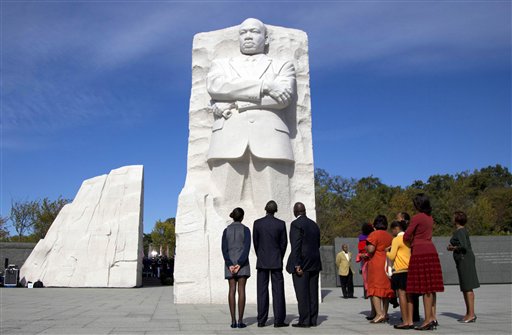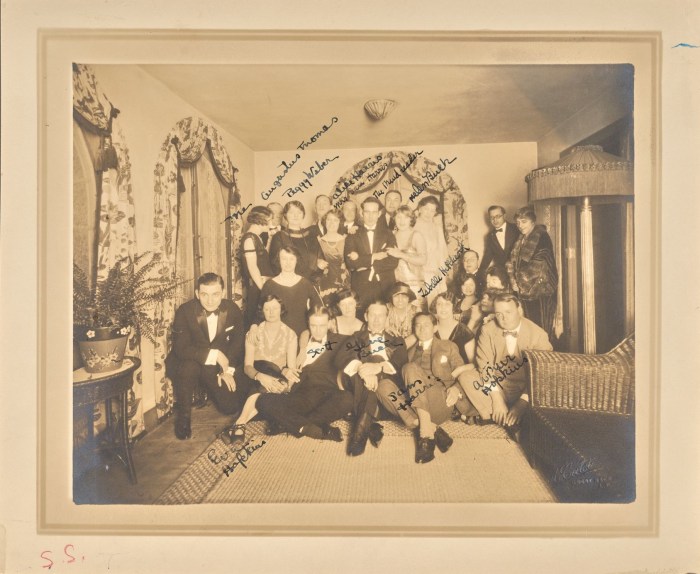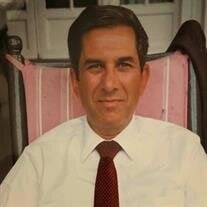
Standing beneath the looming presence of Dr. Martin Luther King Jr., President Barack Obama carved out his own version of black leadership with a message of racial unity.
A sense of inescapable blackness surrounded Sunday’s dedication ceremony for the King memorial. The 30-foot-tall granite likeness is the first on the National Mall to honor an African-American, joining memorials for two white presidents who owned slaves and a third who ended such bondage.
Obama responded by stirring the loyalty of his restive black base while reaching to include all Americans, linking himself to King’s “constant insistence on the oneness of man” and the slain leader’s efforts to help not just black people, but all those in need.
He used the colorblind suggestion that Americans look at the hard times King conquered, and understand the challenge of navigating the troubles of today.
“At this moment, when our politics appear so sharply polarized, and faith in our institutions so greatly diminished, we need more than ever to take heed of Dr. King’s teachings,” Obama said. “He calls on us to stand in the other person’s shoes, to see through their eyes, to understand their pain.”
At times, it seemed as if the shoes to which Obama alluded were his.
He drew subtle parallels between himself and the man in stone behind him, the “black preacher with no official rank or title” who helped shape “an America that is far more fair and more free and more just” than it was in 1963, when King delivered his iconic “I Have A Dream” speech on that same Mall.
“Even after rising to prominence, even after winning the Nobel Peace Prize, Dr. King was vilified by many … He was even attacked by his own people,” Obama said.
The black Nobel Peace Prize winner who never held elected office, as seen by the black Nobel Peace Prize winner elected to the highest office in the land.
“We are right to savor that slow but certain progress,” Obama said. “… And yet it is also important on this day to remind ourselves that such progress did not come easily; that Dr. King’s faith was hard-won; that it sprung out of a harsh reality and some bitter disappointments.”
Unlike his other infrequent remarks on race, which were mostly responding to problems, Obama set his own terms on Sunday.
He did not explore America’s racial dynamics or cite lingering racial barriers, as he did during the 2008 campaign to counteract remarks by his pastor, the Rev. Jeremiah Wright. Nor did he chide his black critics, as he did in a speech before the Congressional Black Caucus last month.
Fifty-nine words into Sunday’s remarks, Obama uttered the word “black” — something his African-American critics have hungered for him to do more often. He called out the names of deceased movement luminaries such as Rosa Parks, Dorothy Height and the Rev. Fred Shuttlesworth. He let his body language speak, too, rocking pensively to Aretha Franklin’s stirring performance of “Precious Lord Take My Hand,” and linking arms with his wife and the vice president to sing “We Shall Overcome.”
In the process, he satisfied at least one of his strongest black critics.
“He was sho’ nuff black,” said Michael Eric Dyson, a Georgetown professor who in the past has said that Obama “runs from race like a black man runs from a cop.”
“He dipped down into the resourceful pool of black oratory, soared high, and expressed the courage of blackness against the bastion of white supremacy and injustice and transcended color to join us all together,” Dyson said after the speech.
Rep. John Lewis, the Georgia Democrat who worked shoulder-to-shoulder with King, said Obama did with King’s memory “exactly what I hoped he would do.”
King “truly believed in the dignity of all human beings. It didn’t matter if you were black, white, Latino, Native American,” Lewis said.
Along with many other speakers at Sunday’s ceremony, Lewis noted that at the time of King’s assassination, he was working to build a multiracial coalition that would bring a “poor people’s campaign” to the National Mall.
“There was a parallel (in Obama’s speech) with what he’s going through now, too,” Lewis said. “When President Obama was running for office there was a low moment in his campaign, and he said, ‘I have to go back to my authentic self.’ I think what we saw here was authentic Obama. It was very powerful.”
Powerful without dwelling directly on black or white, said Colin Powell, the Republican and first black secretary of state under President George W. Bush.
“This wasn’t a speech about race,” Powell said. “It was a speech about the future of America. He touched all the bases: where we have been, where we are going, where we are now, and where we have to be.”
Not everyone was impressed. David Kairys, a Temple University law professor and civil rights attorney who attended King’s 1963 March on Washington, wished Obama had provided a clear reckoning of remaining racial problems.
“This specific occasion is about the struggle against racial oppression,” Kairys said, then mentioned that black unemployment is twice the white rate and blacks still suffer disproportionately from many social ills.
“We eliminated the worst forms of explicit racism and it became taboo to be racist, but the results of segregation and Jim Crow were basically left in place and just continued over the last 40 or 50 years,” he said. “That’s at least worth some kind of direct comment.”
Yet he understood, in some way, why Obama made that choice: “To be fair, he’s running for reelection. Also, he never told us he was going to be a champion against racial oppression. This (speech) is probably who he really is.”
Most others were more complimentary. Even the conservative talk show host Mike Gallagher, who is determined to defeat the president in 2012, said that the way Obama honored King’s legacy was “brilliant.”
“It was a beautiful, powerful message about what can be achieved in this country,” Gallagher said. “I really appreciate the fact that he acknowledged as a black man how much progress we’ve made. . And it kills me to say this, because I think Obama is wrecking the country.”
Paul and Carol Cooper, a white retired couple from Kingston, NY, heard King’s “Dream” speech in person in 1963. Before Sunday’s speech, they had hoped Obama would discuss the work still undone to fulfill King’s dream.
On Sunday, Paul Cooper called Obama’s remarks a “classic.”
“Obama showed us repeatedly,” he said, “that King belongs not merely to black people, but to the whole country.”
___
Jesse Washington covers race and ethnicity for The Associated Press. He is reachable at www.twitter.com/jessewashington or jwashington(at)ap.org.
Copyright 2011 The Associated Press



































